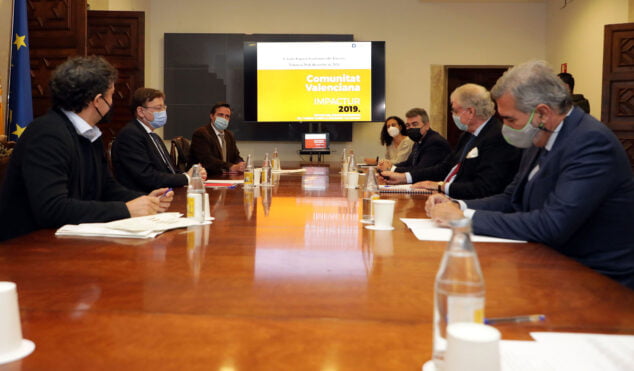The President of the Generalitat, Ximo Puig has highlighted the need to join forces between public administrations to rescue and modernize the tourism sector after the pandemic caused by COVID-19.
Ximo Puig made these statements during the presentation ceremony of the results of the study of the economic impact of tourism on the economy and employment in the Valencian Community 'Impactur Comunitat Valenciana 2019' of Exceltur, which was also attended by the vice president of Exceltur, José Luis Zoreda; the president of Servigroup, José M.ª Caballé; the president of Balearia, Adolfo Utor; the president of Air Nostrum, Carlos Bertomeu, the regional secretary of Tourism, Francesc Colomer, and the general director of Tourism, Herick Campos.
During his speech, the president assured that the collaboration between all public administrations, both the Government of Spain and the Generalitat and the town councils, "will allow articulating the rescue operation of this essential sector for the Spanish economy and for the Community. Valenciana ", which represents 15,5% of Valencian GDP and 15,9% of employment.
As he explained, "it is necessary to articulate a powerful shock plan to save the companies that were viable, and that may be viable, and provide them with sufficient solvency to go through these difficult months." In this sense, the president has referred to the measures to attend the short term already implemented by the Consell to support the sector, such as the Viatgem Bonus or aid to SMEs and the self-employed, but has assured that "we are aware of the need to articulate new responses, more effective and determined to guarantee solvency and positive action that does not stop the reconversion of the sector ".
The head of the Consell has highlighted the need to accelerate the reconversion, rethink the production model, implement the digitization of the sector, and improve its sustainability, for which the already existing strategic plan for tourism must be accelerated, as well as endowed with economic capacity "to resist, because if we do not resist now we will not be able to undertake the deep modernization that we also need."
'Schengen Area'
During the event, the president also raised the need to generate a European mobility framework that is "clear and shared", for which he has called for a 'European Schengen area in mobility', which enables "the freedom of movement of people, as the merchandise is allowed. "
Ximo Puig has assured that "we must create a space of trust and security, since they constitute the key elements of our tourism policy". "It does not make sense -he added- that each state propose a mobility model, but if there is a European mobility, with measures such as antigen tests or vaccination, we must agree, because the basis of tourism is mobility" .
Impactur study
As can be seen from the study presented by Exceltur, the economic impact of tourism in the Valencian Community in 2019 (tourism GDP) amounted to 17.883 million euros, which represents 15,5% of the total Valencian GDP.
In addition, these figures show an increase of 4,5% compared to 2018, and the best figure in absolute terms of the historical series of evolution of tourism GDP. After six years of continuous growth in activity, with an average annual increase of 7%, tourism grew in 2019, 3,3 percentage points above the Valencian economy.
Regarding the added value generated by tourism activities in the Valencian Community, the study highlights that it represents 11,6% of the economic impact of tourism throughout Spain in 2019, growing 0,7 points above the sector average in Spain in the last six years.
The study indicates that all the components of the tourist demand of the Valencian Community contributed to this intense dynamism. Specifically, the behavior of foreign demand stands out, since 2016 the main component of tourism demand in the Region, led by the loyalty and resilience of the British market. Despite the slight decline in this market due to the uncertainty of Brexit, there was a public and private commitment to diversification and boost other markets, such as the French and Nordic markets.
Regarding employment, the report details that tourism activity has generated 318.522 jobs in the Valencian Community in 2019, the maximum in the historical series, which represents 15,9% of the total employment of the Valencian Community in the same year. As a whole, employment in this sector registered a year-on-year growth of 4,2%, experiencing six consecutive years of growth.
The capacity to generate new jobs in 2019 was extended to all the activities characteristic of tourism. The notable generation of employment promoted by tourism has consolidated the sector as the main driver and contributor to employment in the Region, its contribution has followed a continuous path of growth since 2014, going from 14,0% in 2014 to 15,9% in 2019.
The study also highlights that tourism generated 3.849 million euros in revenue, that is, 15,3% of total taxes in the Valencian Community.
Finally, regarding the impact of the pandemic caused by COVID-19 on tourism activity, estimates point to a drop at the end of 2020, of 61,3% compared to 2019. However, this drop is somewhat less than the average estimated for the whole of Spain by Exceltur in its last scenario for the month of October, which amounts to 69,6%, due to the greater presence of national demand and local residents in the demand structure of the Valencian Community.








And what about the rest of the sectors? Have you not learned that you cannot live only from Tourism? That is work for 3 months and misery the rest of the year, no matter how much tourism is intended to be extended throughout the year. People work or should work and have a life with their obligations and responsibilities beyond partying. Also without work there is no money to pay for a vacation.